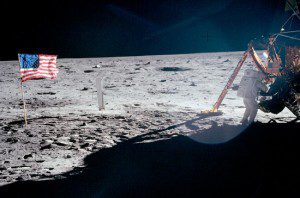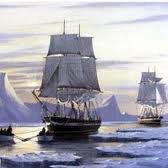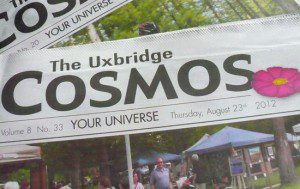
It was the summer I turned 20. It was also the summer of anti-war demonstrations on Canadian and U.S. university campuses. It was the summer of Chappaquiddick and then Woodstock. Then, in the middle of the night, on July 20, 1969, we heard those indelible words.
“One small step for a man,” Neil Armstrong said between bits of static on the TV feed from the moon. “One giant leap for mankind.”
There was a lot of history that summer. Judy Garland committed suicide. Dr. Henry Morgentaler provided pro-choice services for women in Quebec. But the moments we most remember were “Eagle,” the Apollo module landing on the surface of the moon, Armstrong stepping carefully down Eagle’s ladder and those words. Of course, they’re not as politically correct as perhaps they should be. Today, Armstrong would have said “humankind.”
Nevertheless, we all think of the moment in terms of where we were, or whom we were with. I remember thinking that the moon wasn’t as romantic anymore. It wasn’t blue cheese. And the only “man in the moon” now was an American pilot from Ohio. I guess that’s what opening up frontiers is about – dispelling myths and reaching out.

Coincidentally, we’ve witnessed news on another frontier, as well. It’s 166 years ago this summer that the John Franklin expedition disappeared. Of course, his family and well-wishers didn’t have the benefit of a scratchy intercom or black and white camera to show them how far he got. For Franklin and his British crewmen, discovering and navigating the Northwest Passage proved a far greater challenge than they could handle. Unlike Neil Armstrong, Michael Collins and Buzz Aldrin of the Apollo 11 mission, all of Franklin’s 134 men died somewhere out there.
This week, the Canadian Coast Guard icebreaker, Sir Wilfrid Laurier, moved into the waters off Beechey Island and began taking underwater imagery of what scientists hope will be the resting place of Franklin’s two doomed ships, HMS Erebus and Terror. Quite apart from the Prime Minister’s ulterior motive of asserting Canadian sovereignty over Arctic lands and waters, the mission to find Franklin’s ships, I think, represents more a validation of a great explorer’s initiative 166 years ago. The same way the Apollo 11 mission changed our perception of the moon, even though he fell short, Franklin’s expedition changed the mythology of the Arctic. The North was no longer out of reach, and only the home of Aurora Borealis and Magnetic North. It still had mystery and killer cold, but it was reachable by humankind.
I view other challengers of mythology with just as much respect, even if they didn’t travel across 400,000 kilometres of outer space to the moon to achieve notoriety the way Armstrong did, or half-way around the world through ice fields to make deadly history the way Franklin did. And a few of those trailblazers are close to home. I think of our own Lucy Maud Montgomery as a trailblazer in literature and Glenn Gould who explored the limits of classical piano performance.

Let me go further. September marks seven years since we started publishing the Uxbridge Cosmos weekly community newspaper. Such landmarks are rarely considered in the same light as putting a man on the moon or a ship’s crew across the Arctic. But consider that very few people gave publisher Conrad Boyce and his community of supporters much hope of success in 2005. Yet, here he is, 350 editions later, reporting, publishing and thriving as a commercial enterprise in the same geographical and publication area as the Globe, the Star and the Post, not to mention the Metroland juggernaut. All this as Conrad continues to participate as actively as ever as a playwright, producer and theatre manager in his community.
Another colleague and friend of ours is doing her own brand of trailblazing next month. On Sunday, Sept. 16, hundreds of volunteers and runners will assemble for the 32nd running of the Terry Fox Run in our community. And that’s principally because its organizer, Julie Slater, has dedicated so much of her adult life to the cause of organizing and raising the profile of this event. I was delighted last month, when our colleagues at the Times-Journal chose Julie as “Citizen of the Year.” But equally important, she continues to energize her family, friends and neighbours about her cause célèbre.
“The Terry Fox Foundation is the gold medal standard in fundraising,” she wrote me in a recent email. “Eighty-five cents of every dollar raised goes to cancer research.”
I have always admired those who go where others won’t – whether the walking on the moon, pushing back frontiers, excelling in artistic pursuit, publishing a weekly newspaper or battling a seemingly insurmountable disease. Armstrong, Franklin, Montgomery, Gould, Boyce and Slater could easily have let summer slip by unexplored and unchallenged.
Instead they have spoken with deeds. They are a breed apart.